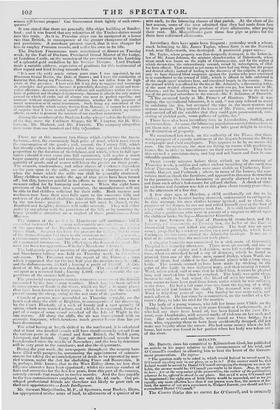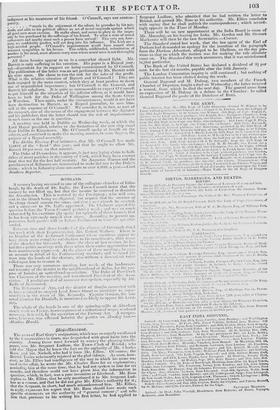IRELAND.
Mr. Barrett, since his committal to Kilmainham Gaol, has published an article in his paper relative to the circumstances of his trial, and O'Connell's conduct in allowing him to bear the brunt of the Govern- ment prosecution. Ile says-
" The question really to be asked is, which would Ireland be served most by; O'Connell standing now in our place,- or as he is? If the answer could be, that Ireland would be served by Darnel O'Connell occupyingthe dungeon we now in- habit, the answer would be, O'Connell you ought to he there. Nay, he aright be here ; fi)r at the very outset of the prosecution, the author of the publication, whoever he be, offered to stand in our place. But as (if it wete O'Connell and he imprisoned) the right arm of Irish liberty would be manacled, and as we are equally., nay more effective here than if our person were free, the answer of Ire- land, the answer of our own conscience is, Richard Barrett, you should not have surrendered Daniel O'Connell." The Courier thinks this no ex,ettse for O'Connell, and is extremelY contem-
porary. indignant at his treatment of his friend. O'Connell, says our " revels in the enjoyment of the odium he provokes by his mis- deeds, and adds to his political offence an act of moral turpitude against which all good men must exclaim. lie stalks about, and seems to glory in the impu- nity he has purchased by the sufferings of his friend. To what a state of moral
callousness and apathy must such a person have arrived ! This very act, how- ever, we confidently predict, will cut deep into his influence. The Irish are a
bigheminded people. O'Connell's imprisonment would have roused their warmest sympathies in his favour. This selfish, eoldbloeded, substitution of another in his stead, must alienate every man whose moral sense is not thoroughly perverted."
All these heroics appear to us in a somewhat absurd light. Mr. Barrett.is only suffering in his vocation. His paper is a Repeal jour- nal—dependent for its support on being countenanced by O'Connell.
The publication of the letter was an act performed by Mr. Barrett with his eyes open. He chose to run the risk for the sake of the profit.
What is the relative situation of Barrett and O'Connell ? They are both engaged in the same contest, which they at least profess to deem one of unparalleled importance ; but O'Connell is the General, and Barrett his subaltern. It is quite as unreasonable to expect O'Connell to put himself in the situation of his inferior officer, as it would have been to look for the Duke of Wellington among the Scots Greys at Waterloo. Then again, under the circumstances, would it not have
been destruction to Barrett, as a Repeal journalist, to save him- self at the expense of O'Connell ? We consider it, in fact, as part of
the compact, one of the terms of the engagement between the Agitator and his publisher, that the latter should run the risk of imprisounient in such cases as the one in question.
A meeting was held in Dublin on Wednesday week, at which the Lord Mayor presided, relative to the formation of the new ship canal from Dublin to Kingstown. Mr. O'Connell spoke at length on the subject, and contrived to make the meeting answer, in some degree, the purpose of a Repeal assembly.
The Dublin Evening l'ost intimates, that Mr. O'Connell lute made 15,000L of the " Rent" this year; and that he ought to allow Mr. Barrett 10 per cent, on that amount.
The Duke of Devonshire, it appears, is just HOW laying claim to half. tithes of many parishes in the county of Cork, which have been exempt from that tax for the last half century. Sir Augustus Warren and the parishioners of Kilmurry are determined to make deLewe to the Duke's claim ; whirh in Kihnurry alone amounts to over 4,000/. a year.—Cork Southern Reporter.



















 Previous page
Previous page